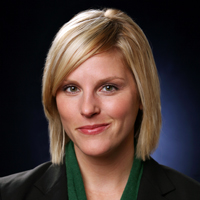In the 1998 commencement speech turned song called "Sunscreen," writer Mary Schmich said, "Live in New York once, but leave before it makes you hard."
Apparently, it has made me a softy.
I only lived in the Big Apple for a grand total of 346 days. And for about 200 of those days, I was traveling across the country. So to say I was immersed in the true New York way of life would be a bit misleading.
I did, however, spend enough time in NYC to change as a person, but not in the way you might expect.
I think at first, the change was quick and negative. I found myself easily annoyed by the "slow" service in the Midwest when I returned for a visit. I started walking and talking faster. I was losing what little patience I barely possessed before. I was mesmerized by the fashion, the lights, the "concrete jungle where dreams are made of."
A few days ago, a friend politely asked if it was OK for him to make an observation about me. He swore it was a compliment, so I allowed him to continue.
He said he had noticed a change in me since returning to Milwaukee from New York. I think the exact quote was, "Not that you were a bitch before, but it seems like now you're just more in touch with things."
Somehow, New York did not make me hard or angry. It did not bring out my most aggressive qualities, or my materialistic ones.
Instead, New York brought out a side in me that to be honest, I wasn't sure I possessed.
And as usual, it started with running.
Admittedly, New York was not an easy transition. I missed home and often felt a little lost and lonely.
So I started running ... with a blind man.
Achilles Heel Track Club is a nationwide organization that helps disabled athletes compete, get out and exercise, and also socialize. The idea of being able to run and volunteer seemed like the perfect way for me to find a place among eight million strong.
Immediately I was assigned to run with a man named Suleiman, who was completely blind, yet easily ran an eight-minute mile.
It wasn't Suleiman's athletic ability, however, that affected me most, it was in turn how a blind man saw things so much more clearly than those of us who can see.
Despite not being able to see the sun, Suleiman would always comment how amazing the warmth felt on his face. He could not see the flowers blooming in Central Park, but yet "saw" their beauty in his mind based on smell and his guide's descriptions.
But what Suleiman saw most clearly, was the character in other people. He could never judge a book by its cover, he could only rely on how they acted. Suleiman could sense stress, sadness, joy -- he had a knack for seeing who people really were.
Over the months I ran with Suleiman, I couldn't help but observe the way he interacted with others. Thoughtful, caring, genuinely interested in what they had to say. And he was very, very intuitive. And never, ever self conscious of his blindness.
Suleiman was just Suleiman, an honest and true person to the core. And someone who never saw blindness as a disability, but as a minor obstacle.
Suleiman taught me to believe in others, but more importantly he encouraged me to believe in myself. Suleiman always thought things to be possible, not impossible.
Although our time together was brief, I can honestly say it changed me for the better. I began to look at things, people and situations differently. Of course I'm not rational and nonjudgemental all the time, but I'm without a doubt self aware.
I guess you could say a blind man helped me see.
Trenni Kusnierek is a sports reporter and radio host who has worked for networks such as ABC, Big Ten, MLB, and NFL. She is currently on 540 ESPN in Milwaukee on both the D-List and Broad Side. Kusnierek is also freelance writing and reporting until January, when she will leave on a service trip to India.
A graduate of Marquette University, she holds a degree in Broadcast and Electronic Journalism. An avid marathon runner, Kusnierek qualified for the 2010 Boston Marathon by running a 3:37:02 at the Lakefront Marathon in Milwaukee.





